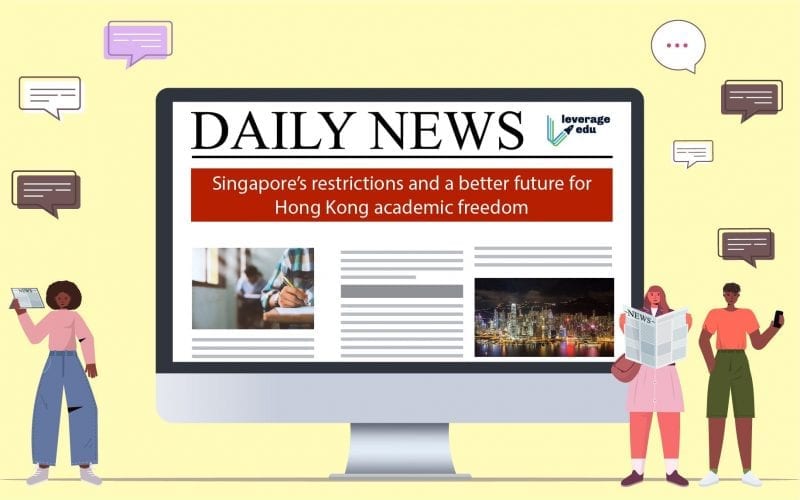In an opinion post published in South China Morning Post, Philip G. Altbach and Gerard A. Postiglione stated that Singapore’s restrictions show a better future for academic freedom in Hong Kong. The imposition of the national security law in Hong Kong puts forward a turning point in the future of higher education in the country. In this situation, a look at the experience of Singapore as a semi-democratic state with limited university autonomy and restrictions on academic freedom may help in understanding what the future holds for Hong Kong.
The authors highlighted that although both countries have successful higher education systems, the future of academics in Hong Kong seems questionable due to the prospect of academic restrictions as part of the new law. Singapore, on the other hand, seems to proceed smoothly in spite of the restrictions already in place.
Related Read: Singapore Education System
Both the places are similar in terms of economies, population and education systems, with Hong Kong having 3 universities within the top 100 as per the Times Higher Education rankings and Singapore having 2. The key difference is that Hong Kong is linked to mainland China, while Singapore has been independent since 1965.
Although Singapore, like Hong Kong, has an open academic society with considerable academic freedom and substantial autonomy provided to universities, there are a number of unwritten restrictions as well. Being too outspoken on political topics or being too critical in their writings on proscribed topics can lead to loss of promotions, or the job itself for the faculty members, with foreigners facing expensive lawsuits or ending of contracts.
Also Read: Study in Hong Kong
In Singapore, the government guides and supports the broad direction of higher education, while the academic community takes care of the internal management of the universities. “There has never been any restriction on access to information or involvement with the rest of the world,” Altbach and Postiglione added. This can be summarised as a system of limited academic freedom and limited institutional autonomy, which has evolved to become an acceptable and effective practice over time.
Hong Kong’s success in education has been credited to its complete institutional autonomy and freedom, with no one being fired for their academic views, actions or writings till the implementation of the new security law. After its implementation, the governing council of the University of Hong Kong overrode the university senate’s decision by dismissing a law professor for his protest activities for universal suffrage. Also, while the internet remains currently open for access by the students and faculty, some books which are considered to have violated the new law have been removed from libraries.
Questions have been raised within the larger academic community on the new law since there is no precise information on which spoken or written words could be interpreted as secession or subversion, which can threaten the international attractiveness of Hong Kong.
Without any doubt, the academic environment in Hong Kong has been freer than Singapore in the last 5 decades, although both have attained similar rates of success globally. In spite of the Hong Kong government’s insistence that academic freedom and expression have been safeguarded, concerns have been raised that education might become less free.
A comparison with Singapore thus shows the coexistence of thoughtfully crafted limitations with academic success, can offer some clarity on the effects of such restrictions on higher education in Hong Kong. Keep watching this space to know more about how Singapore’s restrictions will be impacting Hong Kong academic freedom! Stay tuned to Leverage Edu for more such news updates about higher education across the globe and don’t forget to check out our exclusive blogs on emerging courses, careers and study destinations!

 One app for all your study abroad needs
One app for all your study abroad needs






















 45,000+ students realised their study abroad dream with us. Take the first step today.
45,000+ students realised their study abroad dream with us. Take the first step today.

